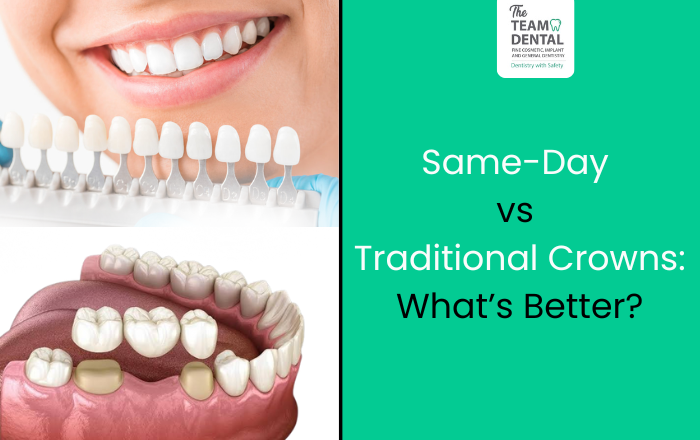If your dentist has told you that you need a dental crown, you’re not alone. Crowns are one of the most common dental treatments and for good reason. They can protect damaged teeth, restore function, and improve how your smile looks. But here’s where it gets tricky: you might have two choices same-day crowns or traditional crowns.
The question is, which one’s right for you?
This guide walks you through the differences between the two, so you can make a smart, confident decision. Whether you want something quick and convenient or prefer the tried-and-true method, you’ll find answers here.
What Are Dental Crowns and Why Do You Need One?
A dental crown is a cap that covers and protects a tooth that’s damaged, weak, or worn down. Think of it like a helmet for your tooth. It brings back your tooth’s shape, strength, and appearance.
When You Might Need a Crown:
- You’ve cracked or chipped a tooth
- You’ve had a root canal
- You have a large cavity that can’t be filled
- Your tooth is worn down from grinding
- You want to improve the look of a misshapen or discolored tooth
What Are Same-Day Crowns?
Same-day crowns do exactly what the name says—they’re made and placed in your mouth in one visit. No second appointment. No temporary crown. No waiting for the lab.
How It Works
Your dentist uses a digital scanner to create a 3D image of your tooth. This scan is used to design the crown using a computer, and then the crown is made right there in the clinic using a milling machine. Once it’s ready, the dentist fits and bonds it to your tooth—all in one sitting.
Benefits of Same-Day Crowns
- Done in a single appointment
- No need for temporary crowns
- No messy molds or impressions
- Less time off work or travel
Possible Drawbacks
- Not ideal for more complex or multi-tooth cases
- Fewer choices in materials
- May cost slightly more depending on the clinic
What Are Traditional Crowns?
Traditional crowns are made using a more familiar process. You visit the dentist, they take impressions of your tooth, and place a temporary crown. A dental lab then makes the final crown, which you get 1–2 weeks later in a second appointment.
How It Works
- The dentist prepares your tooth
- They take an impression or scan
- You go home with a temporary crown
- In 1–2 weeks, the permanent crown arrives from the lab
- You return for placement
Benefits of Traditional Crowns
- Works well for complicated cases
- More options in materials, including metal or porcelain fused to metal
- Strong track record of long-term results
What’s Not So Great
- You’ll need at least two visits
- Temporary crowns can come loose or feel uncomfortable
- Longer wait time
Same-Day Crowns vs Traditional Crowns: A Quick Comparison
| Feature | Same-Day Crowns | Traditional Crowns |
|---|---|---|
| Visits | One | Two or more |
| Time | 1–2 hours | 1–2 weeks |
| Materials | Usually ceramic | Porcelain, zirconia, metal |
| Best For | Simple cases | Complex or multi-tooth cases |
| Cost | Slightly higher | Slightly lower |
| Durability | 10–15 years | 10–20+ years |
Both types are strong, look natural, and last for years. The right choice depends more on your needs than the technology used.
How to Choose: What Matters Most
Look at Your Tooth Problem
- Small damage or single-tooth issues? Same-day crowns work great.
- Cracks near the gum line or multiple crowns needed? Traditional might be better.
Think About Your Time
- If you have a tight schedule or live far from the clinic, same-day crowns can save a lot of hassle.
- If you’re okay with waiting and prefer more material options, traditional crowns work just fine.
Budget
- The cost difference isn’t huge, but same-day crowns may cost slightly more.
- If you have dental insurance, both options are usually covered—just ask your clinic for a breakdown.
Which One Do Dentists Prefer?
Dentists don’t choose based on trend they look at what’s best for your specific case. For example, Dr. Samidha Patil at The Team Dental Clinic in Kharadi, Pune, often recommends same-day crowns when time and comfort matter most, and traditional crowns when more complex restoration is needed.
They don’t guess. They assess your tooth structure, bite, and history, then walk you through both choices clearly. That’s the kind of conversation that saves you time, money, and future dental problems.
FAQ
1. Are same-day crowns as strong as traditional ones?
Yes, for most people. They’re milled from ceramic blocks and last 10–15 years or more with good care.
2. Do same-day crowns look natural?
They’re designed to match your natural tooth color and shape. In most cases, you won’t be able to tell the difference.
3. Are traditional crowns outdated?
Not at all. They’re still a great option, especially when more detailed work or stronger materials are needed.
If you’re still unsure, don’t stress. The best thing you can do is talk to a dentist who’s familiar with both same-day and traditional crowns and can guide you based on what’s actually going on in your mouth—not just what’s popular.
If you’re looking for dental crown treatment in Kharadi, check out The Team Dental Clinic, led by Dr. Samidha Patil. Whether you’re leaning toward the convenience of a same-day crown or considering the traditional route, this clinic has the tools, the experience, and the clarity to help you make the right choice.
👉 Book a visit with The Team Dental Clinic in Kharadi today and get the crown that fits your tooth and your life just right.

